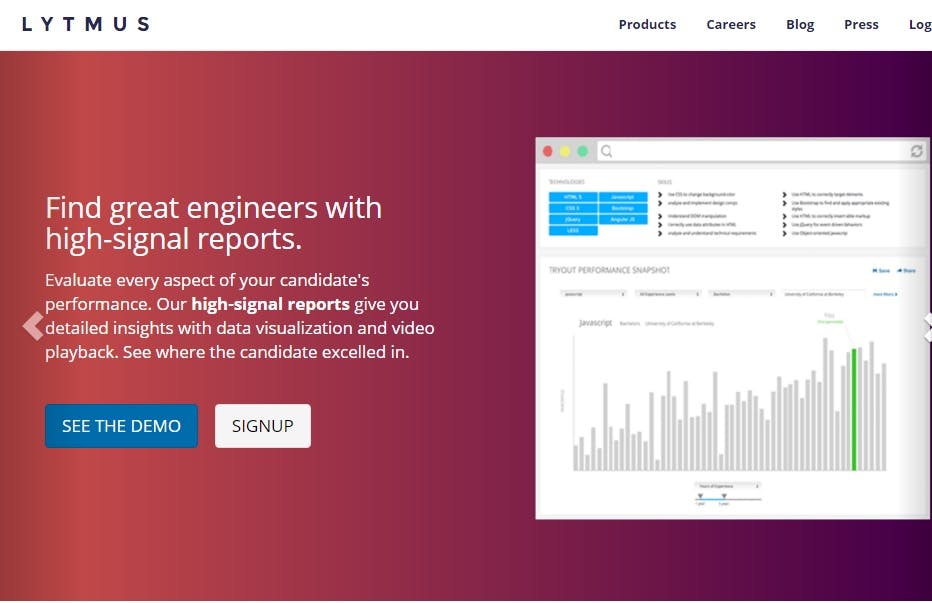This week, the Startup Spotlight shines on Lytmus, with CEO and Co-founder Abhay Parekh. Responses were edited for clarity and brevity.
Should your startup be profiled? Send your email here.
Lytmus is an online service that enables recruiters to quickly sort through technical candidates to determine who among them to call for an initial phone screen, and then to assess their skills with real world engineering and coding tasks.
Q. What problem are you trying to solve?
A. Abhay Parekh: The main problem in hiring is that traditional interviewing processes look mostly at who people are on their resume. They don’t objectively look at what candidates can do. Similarly, instead of letting coders show their talents in “real world” settings, they limit them to whiteboard type of environments and “gotcha” questioning. This, not surprisingly, disillusions the best candidates and leads to overall sub-par reviews and hiring choices.
The overall solution is a major disruption in the hiring process via unique online talent platforms. For our part, we created Lytmus, the most accurate technology solution for identifying and engaging top performing technical job candidates.
Q. Describe the business, core products and services?
Lytmus addresses each step of the hiring funnel, levels the playing field for applicants, and improves the hiring process for companies of all sizes.
Lytmus Pre-Screen reduces the number of unqualified phone screens and helps determine candidates’ skills early in the hiring process. It goes beyond the resume to uncover the best candidates based on what they can actually do, and how they perform on realistic coding projects.
Lytmus Phone Screen allows you to pair-program with the candidate in a real development environment. With this inside view, companies get to know what it’s like to work with a candidate and see how they think.
Lytmus Take Home reduces the chance of a bad on-site interview. If a hiring manager is uncertain about a candidate after a phone screen, they can send them an additional project and learn more before an on-site interview. After the submission, Lytmus’ auto-graders run in the background and can check a candidate’s work.
Lytmus On-Site quickly sets candidates up on a real project. See how candidates perform beyond whiteboard coding challenges. Not brittle like other offerings, Lytmus is comprehensive and flexible. Set up a Hadoop environment and ask questions in SPARK, or spin up a web environment and ask questions in Django.
Q. What financial support did you have to launch the business?
We raised $7.2 million in funding from New Enterprise Associates and Accel Partners and officially launched in the fall of 2015.
Q. Who are your customers and what is the business model?
Lytmus customers are companies looking to hire and keep the best tech talent in the market today, including computer coders and engineers. Lytmus customers already include hiring teams at hot tech companies across the U.S., including Pinterest, Okta and Pocket Gems.
It’s a SaaS model; we charge by usage and scope of assessment.
Q. Tell us about the team you have built.
Using our own methodologies, we’ve brought together a dedicated and talented team of computer coders, engineers and startup veterans.
Q. What is your background?
I am the co-founder and CEO of San Francisco-based Lytmus Inc. Since 2003, I’ve also been an Adjunct Professor at UC Berkeley, EECS (Electrical Engineering and Computer Sciences).
Before joining the EECS department, I spent a number of years at AT&T Bell Laboratories, T. J. Watson Research Center IBM and Sun Microsystems, working on various research problems, mostly in the area of computer networking. Prior, I was co-founder, as well as President and CEO of San Francisco-based FastForward Networks as well as a partner with the venture and growth firm Accel Partners.
I received a B.E.S. in Mathematical Sciences from Johns Hopkins University in 1983, an S.M. in Operations Research from the Sloan School of Management at MIT in 1985, and a Ph.D. in Electrical Engineering and Computer Science from MIT. I then worked with the MIT Laboratory for Computer Sciences.
